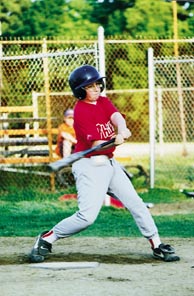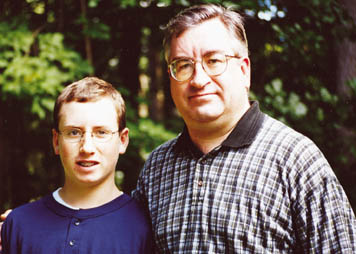
SIDEBAR
All in the Family
More
than any other sport, baseball is handed down through the generations
like the best family stories.

While
Charlie was developing as a coach, Chris quietly became a special player.
His team held a narrow lead when the coach asked Chris to pitch. Chris swiftly closed the door, allowing only one base runner in the final innings of the game. While some teammates taunted others and pumped their fists, Chris just shook many hands with a huge smile.
As
proud of his sportsmanship as he was of Chris's athletic feats, Charlie
had never been happier at a baseball game.
John
Cunningham
and Charlie Hartford are fraternity brothers and close friends who live
in the Boston area. You may contact John at: c3cunningham@aol.com
Magazine
Winter/Spring 2001

Charlie Hartford and son, Chris.
A Father's
Field of Dreams
Charlie
Hartford discovered that "baseball is a platform for intimate talk,"
where a father can find time with, and for, his children.
by John Cunningham '78
When
Charlie Hartford '80 was a boy in suburban Boston, he never dreamed of
attending a small liberal arts college in Indiana. He never dreamed of
becoming a publisher of college textbooks for publishing conglomerate
Houghton-Mifflin. But even as a young man, he dreamed of taking his son
to his first baseball game.
Charlie envisioned the perfect first game: a clear, crisp day; a game
filled with unscripted baseball drama; and the best seats in Fenway Park.
So, not long after his son, Christopher, celebrated his seventh birthday,
the former Wabash English major-turned-textbook publisher called the Red
Sox ticket office on a long shot. He knew the best seats are hoarded by
season ticket holders, who rarely return them for sale. But just as he
called, two box seats became available. Charlie and Christopher snagged
second-row seats behind the on-deck circle.
Chris, now 13, still remembers those seats and their proximity to baseball's
magic.
"I never realized how fast a major-league baseball moves, the sound it
made, and the pop in the catcher's mitt," he says. He recalls the details
of the dramatic Red Sox rally that won the game. He remembers the crowd
cheering, and his dad teaching him how to keep score and follow the strategy
of the game.
"Chris was planted in his seat the entire game," Charlie says with a laugh.
"He was clearly hooked." It was a game at Fenway with his father in 1966
that ignited Charlie's own passion for the game. His voice rises as he
remembers: "It was Sox against the Washington Senators. Ray Culp was pitching
for the Sox, and 6'7" Frank Howard was the biggest player most of us had
ever seen, but Culp struck him out every time."
Although he fell in love with the game, Charlie was no athlete. He never
played much baseball in high school or college. As he married and began
raising his own son, he hoped only that Chris would come to share his
joy in the game. What followed went beyond his expectations.
After that game at Fenway in 1994, Chris joined a Little League team.
Chris honed his skills with a pitch return device in the front yard.
"I played so much there that I wore out our lawn," Chris says and grins.
"In fact, I was obsessed."
Chris played his first year in the farm league with an undefeated team.
But he was small, inexperienced, and often placed safely out of the action
in right field. Then, in the final inning of the final game of the season
while the opposing team had tying runs on base, he made a sensational
running catch to end the game.
Chris earned a promotion to minor league and his father became his coach.
Charlie also enlisted other coaches to teach the rules, skills, and sportsmanship
of the game. His teams had average records, but they had special chemistry.
Every child got playing time, individual support, and ice cream after
the games. Many literally jumped with enthusiasm at the start of practices
and games. Charlie is proud of the many thank-you notes from parents and
is touched by one mother's words: "This was the best experience my son
has ever had." It was a father's labor of love, but it enriched Charlie
in other ways.
"Coaching made me a better manager at work," he explains. "In managing
Chris and his teams, I had to discover each player's strengths, define
their roles, and treat each person as special. Each needed different kinds
of support. But with all of them, you had to tolerate mistakes and explain
why they happened so that the player could get better." Charlie uses the
same principles as touchstones for managing other professionals, balancing
attention to individual needs with what is best for the team.
While Charlie was developing as a coach, Chris quietly became a special
player. By age 12, he was selected for the all-star game. In five innings
at shortstop, he made two stunning defensive plays that brought loud ovations,
and hit a two-run triple off the left-field fence. His team held a narrow
lead when the coach asked Chris to pitch. Chris swiftly closed the door,
allowing only one base runner in the final innings of the game. While
some teammates taunted others and pumped their fists, Chris just shook
many hands with a huge smile. As proud of his sportsmanship as he was
of Chris's athletic feats, Charlie had never been happier at a baseball
game.
Last spring saw Chris graduate to the Senior League and make the roster
of the middle school team. He continues pitching like an ace, and he upped
the ante at the plate, hitting over .500 for the season.
Charlie now watches from the sidelines. And although he's enjoyed watching
his son's astonishing baseball development, he adds: "I really just want
him to enjoy the game." He feels the same way about his son's academic
and musical interests. He tries to nurture without applying any pressure.
"My dad is supportive, but he doesn't overcoach," Chris says. "He focuses
on the good things, and he never yells at the ump or acts crazy." Chris
says his father taught him that good teammates and coaches "pick each
other up" and "don't let the mistakes get you down."
But when he recalls his favorite baseball memories, Chris tends to underplay
his own on-field accomplishments. Instead he speaks of watching last year's
Red Sox-Yankee playoff games late into the night with his sister, Ellen,
and his mom, who is a Yankees fan. He loved attending a Red Sox playoff
victory with his dad. He talks about the trip to the Hall of Fame with
three generations of family, and he laughs at the irony of his father's
loyalty to the Red Sox and his grandfather's equal backing of the arch-rival
Yankees.
As for Charlie, baseball is just part of being a father. He loves playing
catch with his son or daughter or watching a lazy summer game with them.
"Baseball is a platform for intimate talk," he says. "It is slow and has
lots of pauses, so you can talk about anything while watching it. And
the players have long careers so that they bridge the generations."
The Hartfords' baseball conversations ebb and flow around personal matters,
social issues, trivia and history: like a slow, deep river connecting
the generations.
If this sounds a bit too mystical, consider baseball's role in Charlie's
life. He was sold on Wabash College by a Boston native and Red Sox fan
working for admissions. The clincher was a night of watching the '75 World
Series at the Lambda Chi house, where he later came to live for four years.
Shortly after college, Charlie was at a party and asked a baseball trivia
question: "Who ended Herb Score's career with a line drive?" Janice Johnson
replied, "Gil McDougald," and she became Janice Hartford a year later.
Then Charlie spent several years learning the publishing trade from a
fellow baseball fan who was also his managing editor. And now Charlie's
daughter is also playing Little League, and Charlie is coaching again.
In W. P. Kinsella's novel Shoeless Joe, Kid Scissons brings together
in an Iowa cornfield players from many generations to hear his message:
"As you begin to speak the word of baseball, as you speak it to men and
women, you are going to find that these men and women are going to be
changed by that life flow, by the loving word of baseball."
Charlie Hartford is speaking baseball when he says, "Fatherhood is a chance
to share things that are most important to you, a chance to give to your
children." He pauses, as if reflecting on his own field of dreams. "It
is a time to see them grow and do betterÉ and to enjoy it."
Return to the table of contents
